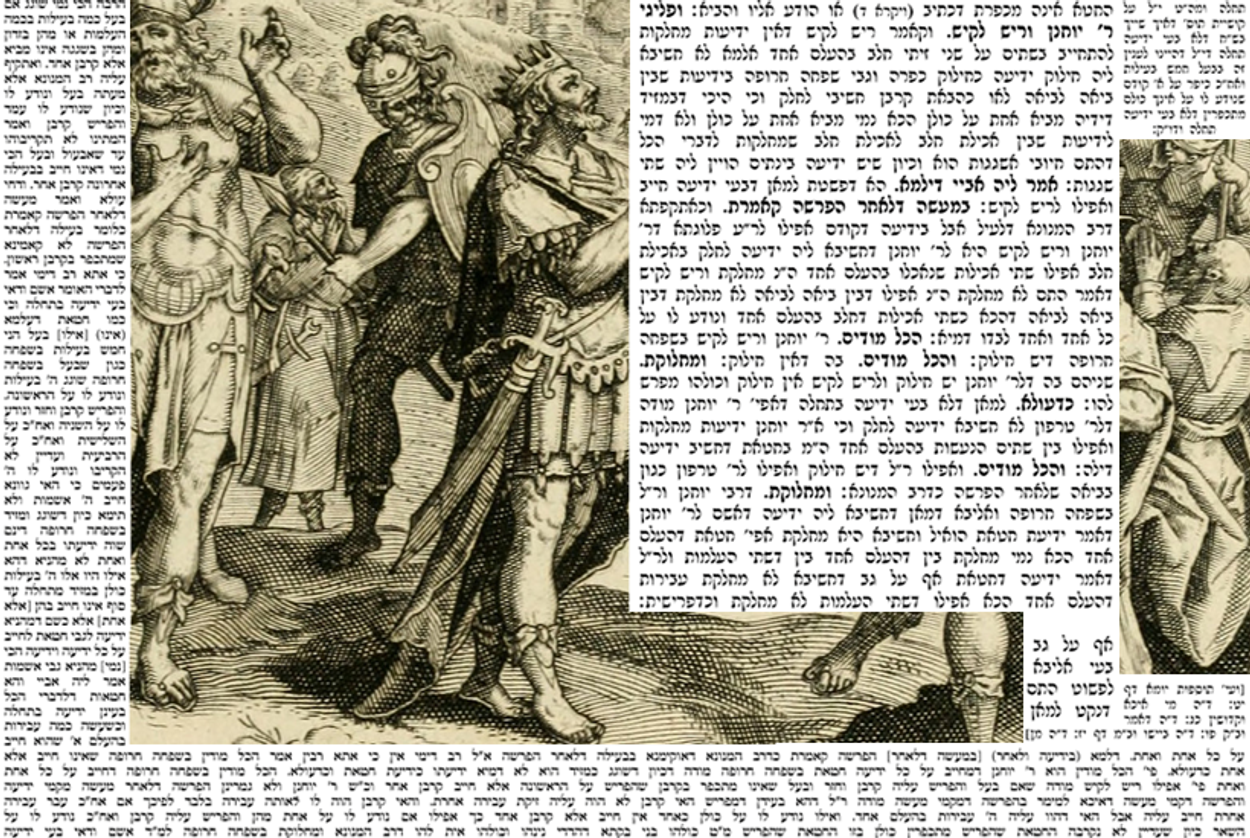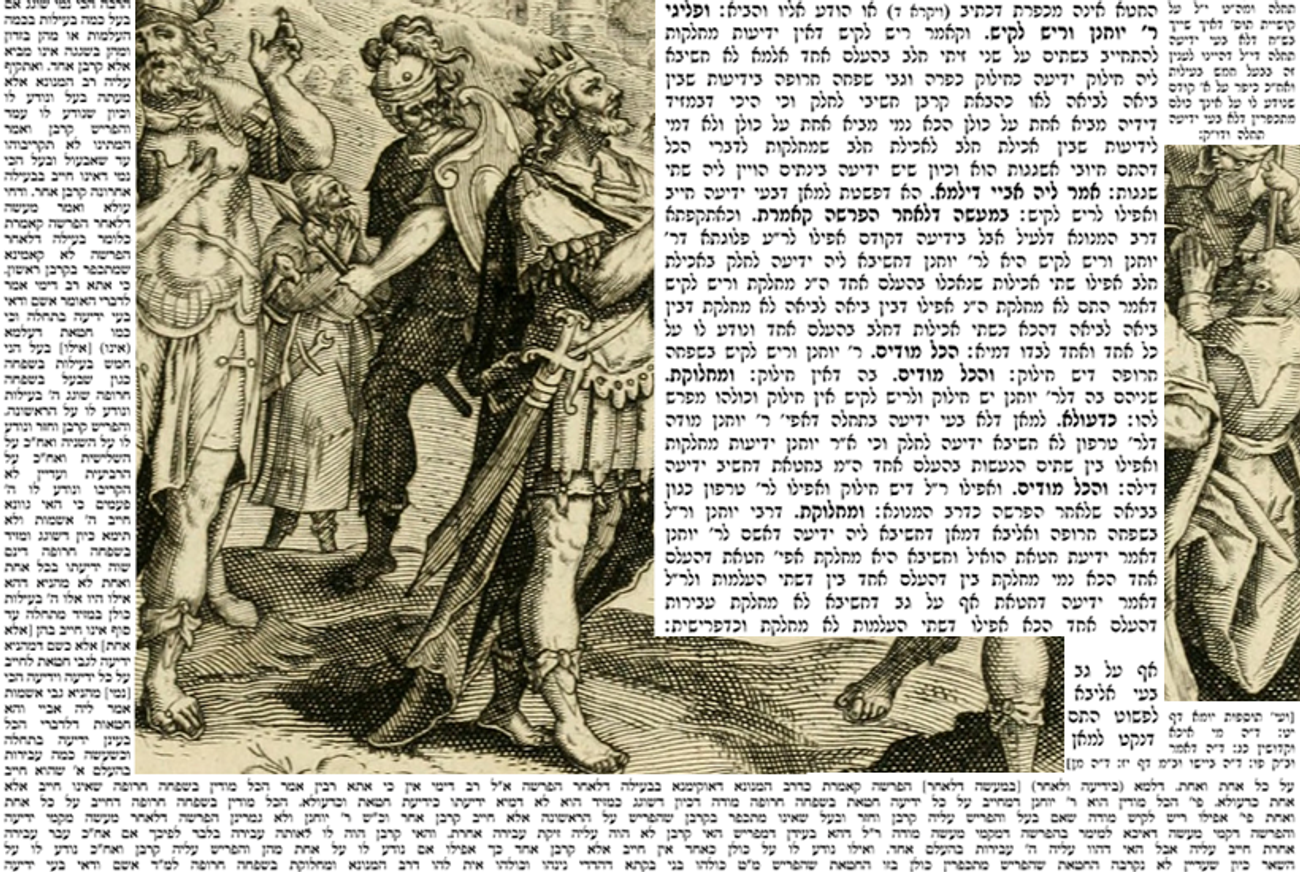Let’s Talk About Sex With Minors, Rape, and ‘Uncovering the Nakedness’ of Sisters
Talmudic rabbis, gladiators of the mind, sought glory and eternal fame—but also pondered the mundane side of being human




Literary critic Adam Kirsch is reading a page of Talmud a day, along with Jews around the world.
Glory is not usually considered an important Jewish value. The ancient Greeks and Romans built whole cultures around the pursuit of individual glory and eternal fame, and much of the Western ethos of competitive individualism can be traced back to those classical sources. The biblical kings of Israel, too, were no strangers to the desire for glory: David strove to kill more Philistines than Saul, an achievement the people celebrated in the song, “Saul has killed his thousands, but David his tens of thousands.” The Temple that Solomon built was in honor of God, but also in honor of Solomon himself, a demonstration of his wealth and power.
In rabbinic Judaism, on the other hand, such considerations are virtually absent. This was for a good reason: In the centuries after the destruction of the Temple and the Bar Kochba revolt, there was simply no worldly arena in which Jews could win the old-fashioned kind of military or political glory. But as Daf Yomi readers saw in a telling passage this week, this does not mean that Jews stopped dreaming of achievement and reputation. Instead, the rabbis, the elite of the Jewish community, imagined a different kind of fame: the reputation of being a subtle and penetrating interpreter of Torah. And when it came to this kind of fame, the Talmud makes clear, the rabbis were every bit as competitive as any Greek wrestler.
At the end of chapter 10 of Tractate Yevamot, the Gemara tells of a conflict that arose between Rabbi Elazar and Rabbi Yochanan. One day, Elazar was teaching law in the study hall—which was the Jewish equivalent of the arena, the place where intellectual combat replaced physical combat—and he laid down a particular ruling. “Rabbi Elazar went and said this halakha in the study hall, but he did not state it in the name of Rabbi Yochanan,” the Gemara explains. Now, if there is one feature of the Talmud that no reader can miss, it is the rabbis’ concern with preserving the exact genealogy of every teaching; long stretches of the Gemara are devoted to figuring out which tanna taught which mishna. For Elazar to omit Yochanan’s name, then, was a serious mistake, and Yochanan was infuriated by it; if his law was going to be passed on to posterity, he wanted to make sure he got the credit for it. A note in the Koren Talmud offers a further explanation for his scrupulousness: Yochanan had no sons to carry on his memory, so it was especially important for him to live on through his teachings.
To assuage his anger, two other rabbis, Ami and Asi, visited Yochanan and reminded him of an earlier case in which strife between sages led to blasphemy. Apparently, it once happened at the synagogue in Tiberias that two sages argued over a technical point of Shabbat law and got so angry that they ended up tearing a Torah scroll. This was such an ill omen that the synagogue eventually became “a place of idolatrous worship.” Surely, Ami and Asi told Yochanan, he did not want to repeat this mistake by getting so angry with Elazar. But the touchy Yochanan missed the point of the story entirely; in fact, he only got angrier, since the story seemed to imply that Elazar was his peer, when in fact the younger sage was only his disciple.
Finally, it was left to Rabbi Ya’akov bar Idi to appease Yochanan, which he did with a biblical example. In the book of Joshua, Ya’akov pointed out, we learn that Joshua “left nothing undone of all that the Lord commanded Moses.” “Now did Joshua, with regard to every matter that he said, say to the Jews, Thus Moses said to me? Rather, Joshua would sit and teach without attributing, and everyone would know that it was from the Torah of Moses.” Just so with Elazar: Because everyone knew that Elazar was Yochanan’s student, it was obvious that the Torah he taught originally came from Yochanan, so he didn’t have to preface every statement with an explicit attribution.
This reasoning finally calmed Yochanan. But why, the Gemara asks, did he get so angry in the first place? The answer comes down to those apparently non-Jewish values of glory and eternal fame. King David, who according to the Bible was a warrior acclaimed for his body count, appeared to the rabbis as a Torah scholar, whose one request of God was as follows: “Master of the Universe, let it be Your will that they will say a matter of halakha in my name in this world when I have passed on to another world.” This is the rabbis’ version of what the Greeks would have called immortality: Instead of being celebrated as a great general or a great king, their David only wanted to be remembered as a great legal scholar. Indeed, the Gemara says, in an image that we have encountered before, that when any law is taught in the name of a dead Torah sage, that sage “mouth[s] the words in the grave.” The human desire for preeminence seems to be constant: The rabbis did not give it up, they simply translated it into another field of endeavor.
And what was the exact point of halakha about which Yochanan was so jealous? The answer has to do with the tricky subject of marriage law as it pertains to minors—in this case, a boy who is 9 years and 1 day old. Ordinarily, Jewish law holds that it is possible for a man to betroth a woman through sexual intercourse. This strikes me as a clever and humane provision, since it avoids stigmatizing premarital sex: If an unmarried couple has sex, they are not punished for it, they are simply married by it. (Of course, if one of the partners is already married, things are a good deal worse, especially for the woman.) But what if the man in question is actually just a 9-year-old boy? To the rabbis, such a boy is considered physically capable of intercourse, but not legally capable of betrothal. What if a 9-year-old has intercourse with his yevama, his dead brother’s widow? Are the two then betrothed, or is the act legally without consequences?
This whole line of questioning is likely to make modern readers very uncomfortable, since it takes for granted that a 9-year-old boy can have sex with a woman—something that today would qualify as child abuse. Part of the difference is that, in Talmudic Judaism as in many other cultures, early marriage was simply taken for granted. (Remember that in Romeo and Juliet, Juliet is 12 years old.) In Tractate Yevamot, however, it is notable that the rabbis address all kinds of unusual, deviant, and illicit sexuality with complete equanimity. Later in this week’s reading, for instance, at the start of chapter 11, the Talmud takes up the question of whether a man may marry the relative of a woman he has raped. Jewish law strictly prohibits a married man from sexual intimacy with his wife’s sister; but if a man rapes a woman, he is free to then marry her sister, even though in both cases he has “uncovered the nakedness” of two sisters, which the Bible forbids.
When discussing sex with a minor and rape—as earlier when discussing bestiality—the rabbis are unflustered. This is not because they condone such acts, but because the purpose of the Talmud (at least here) is not moral exhortation, but practical legal remedies. Of course rape is a crime, and the Torah provides for punishment for it; but the rabbis tacitly acknowledge that it will happen, just as in earlier passages they’ve acknowledged that sometimes forbidden lovers will undergo a marriage ceremony, even though they shouldn’t. The question that arises is, what then? For the Talmud, the fabric of law must always be repaired after it is torn, and no human situation, no matter how strange or appalling, is considered beyond the cognizance of Torah.
***
To read Tablet’s complete archive of Daf Yomi Talmud study, click here.
Adam Kirsch is a poet and literary critic, whose books include The People and the Books: 18 Classics of Jewish Literature.
Adam Kirsch is a poet and literary critic, whose books include The People and the Books: 18 Classics of Jewish Literature.